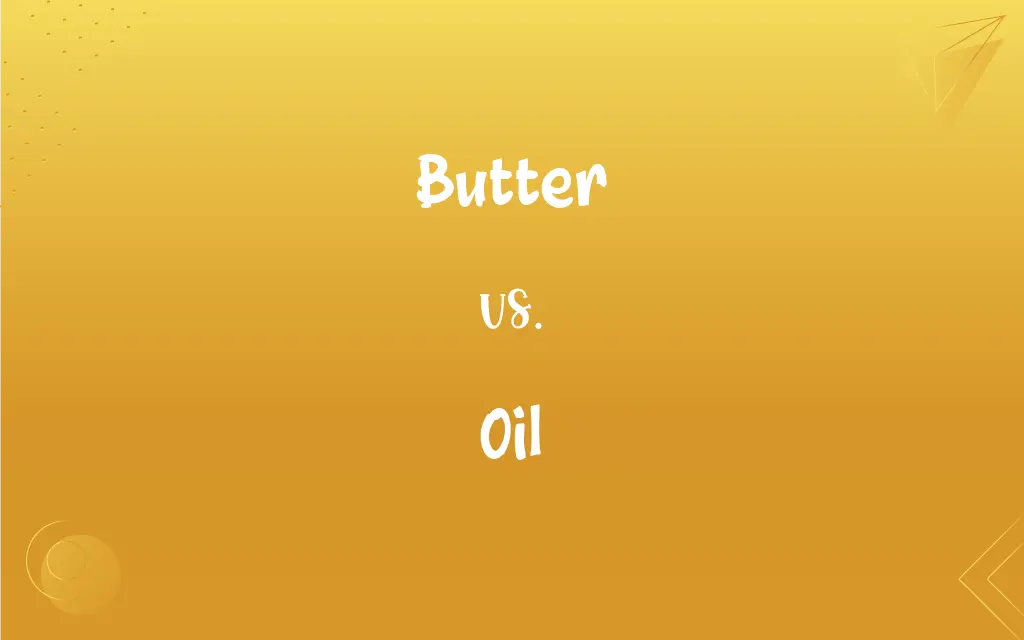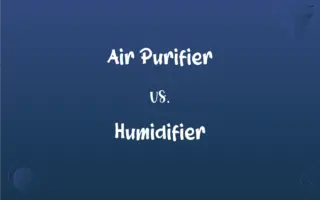Butter vs. Oil: What's the Difference?
Edited by Aimie Carlson || By Janet White || Updated on November 18, 2023
Butter is a dairy product made from cream, while oil is a liquid fat extracted from plants or animals.

Key Differences
Butter is a dairy product that results from the churning of cream, often derived from cow's milk. Oil, on the other hand, is a liquid fat that is extracted from various sources such as olives, sunflower seeds, and even certain animals like fish.
Butter adds a rich and creamy flavor to dishes and is often used for sautéing, baking, and as a spread. Oil, with its higher smoke point, is more suited for frying and is also used in dressings and marinades.
Butter contains saturated fats and cholesterol, and it’s also a source of vitamins A, D, E, and K. Oil, depending on its source, can be high in monounsaturated and polyunsaturated fats and typically lacks cholesterol.
At room temperature, butter usually remains solid, while oil is in a liquid state. This difference is due to the saturated fat content in butter compared to the unsaturated fats found in oil.
Butter can turn rancid if not stored properly, often requiring refrigeration. Oil, depending on the type, can be stored at room temperature, but it's essential to keep it in a cool, dark place to maintain its quality.
ADVERTISEMENT
Comparison Chart
Origin
Made from cream, often from cow's milk.
Extracted from plants or animals.
Physical State
Solid at room temperature.
Liquid at room temperature.
Nutritional Content
Contains cholesterol and saturated fats.
Typically cholesterol-free and has unsaturated fats.
Usage in Cooking
Used for sautéing, baking, spreading.
Used for frying, dressings, marinades.
Storage Requirements
Often requires refrigeration.
Stored at room temperature in a cool, dark place.
ADVERTISEMENT
Butter and Oil Definitions
Butter
Used in reference to something considered very easy.
Passing that test was butter for her.
Oil
An essential oil or perfumed substance.
The room was filled with the pleasant scent of lavender oil.
Butter
A creamy substance resembling butter in consistency.
The cookie had a rich butter flavor even without real dairy.
Oil
Refers to a state of smooth operation or ease.
With the new manager, everything runs like a well-oiled machine.
Butter
A flattering or ingratiating manner.
She laid on the butter thick when complimenting her boss.
Oil
To lubricate or coat with oil.
He oiled the squeaky hinge.
Butter
A dairy product made from churning cream.
She spread some butter on her toast.
Oil
Any of numerous mineral, vegetable, or synthetic substances or animal or vegetable fats that are generally slippery, combustible, viscous, liquid or liquefiable at room temperatures, soluble in various organic solvents such as ether but not in water, and used in a great variety of products, especially lubricants and fuels.
Butter
A soft yellowish or whitish emulsion of butterfat, water, air, and sometimes salt, churned from milk or cream and processed for use in cooking and as a food.
Oil
Petroleum.
Butter
A spread made from fruit, nuts, or other foods
Plum butter.
Cashew butter.
Oil
A petroleum derivative, such as a machine oil or lubricant.
Butter
A vegetable fat having a nearly solid consistency at ordinary temperatures.
Oil
A protective or cosmetic liquid applied to the skin or hair.
Butter
Flattery.
Oil
Oil paint.
Butter
To put butter on or in.
Oil
A painting done in oil paint.
Butter
A soft, fatty foodstuff made by churning the cream of milk (generally cow's milk).
Oil
To lubricate, supply, cover, or polish with oil.
Butter
Any of various foodstuffs made from other foods or oils, similar in consistency to, eaten like or intended as a substitute for butter (preceded by the name of the food used to make it).
Peanut butter
Soy butter
Chocolate butter
Oil
Liquid fat.
Butter
Any of various substances made from other (especially plant-based) oils or fats, used in moisturizers, cosmetics, etc.
Oil
Petroleum-based liquid used as fuel or lubricant.
Butter
Any specific soft substance.
Butter of antimony; butter of arsenic
Oil
Petroleum
Butter
A smooth plane landing.
Oil
(countable) An oil painting.
Butter
Someone who butts, or who butts in.
Oil
(painting) Oil paint.
I prefer to paint in oil
Butter
(transitive) To spread butter on.
Butter the toast.
Oil
(attributive) Containing oil, conveying oil; intended for or capable of containing oil.
Oil barrel; oil pipe
Butter
To move one's weight backwards or forwards onto the tips or tails of one's skis or snowboard so only the tip or tail is in contact with the snow. Similar to applying butter to bread with then end of a butterknife.
Oil
(transitive) To lubricate with oil.
Butter
To spin on skis or a snowboard using only the tips or tails being in contact with the snow
Oil
(transitive) To grease with oil for cooking.
Butter
To increase (stakes) at every throw of dice, or every game.
Oil
Any one of a great variety of unctuous combustible substances, more viscous than and not miscible with water; as, olive oil, whale oil, rock oil, etc. They are of animal, vegetable, or mineral origin and of varied composition, and they are variously used for food, for solvents, for anointing, lubrication, illumination, etc. By extension, any substance of an oily consistency; as, oil of vitriol.
Butter
Very smooth, very soft
That landing was total butter!
Oil
To smear or rub over with oil; to lubricate with oil; to anoint with oil.
Butter
An oily, unctuous substance obtained from cream or milk by churning.
Oil
A slippery or viscous liquid or liquefiable substance not miscible with water
Butter
Any substance resembling butter in degree of consistence, or other qualities, especially, in old chemistry, the chlorides, as butter of antimony, sesquichloride of antimony; also, certain concrete fat oils remaining nearly solid at ordinary temperatures, as butter of cacao, vegetable butter, shea butter.
Oil
Oil paint used by an artist
Butter
One who, or that which, butts.
Oil
Any of a group of liquid edible fats that are obtained from plants
Butter
To cover or spread with butter.
I know what's what. I know on which sideMy bread is buttered.
Oil
Cover with oil, as if by rubbing;
Oil the wooden surface
Butter
To increase, as stakes, at every throw or every game.
Oil
Administer an oil or ointment to ; often in a religious ceremony of blessing
Butter
An edible emulsion of fat globules made by churning milk or cream; for cooking and table use
Oil
A viscous liquid derived from plants, animals, or petrochemicals.
She used olive oil for her salad dressing.
Butter
A fighter who strikes the opponent with his head
Oil
A painting medium or technique using oil-based paints.
The artist preferred oil for his portraits.
Butter
Spread butter on;
Butter bread
Butter
To spread or apply butter on a surface.
He buttered his bread generously.
FAQs
What is butter made of?
Butter is made from churning cream, usually from cow's milk.
Can butter be used as a replacement for oil in recipes?
Yes, but it may change the texture and flavor of the dish.
Can I store butter outside the fridge?
It's best to store butter in the fridge to prevent it from turning rancid.
What is the smoke point?
It's the temperature at which oil or butter starts to break down and produce smoke.
What are the common uses of oil in the kitchen?
Frying, making dressings, and baking.
Is butter used in vegan recipes?
No, as butter is a dairy product. Vegan alternatives are available.
Which oils are considered the healthiest?
Olive oil, flaxseed oil, and avocado oil, among others.
How is oil typically extracted?
Oil is extracted from plants, animals, or through petrochemical processes.
Which is healthier, butter or oil?
It depends on the type of oil and individual dietary needs, but many oils have heart-healthy unsaturated fats.
Why does butter solidify at room temperature?
Due to its high saturated fat content.
Why does butter add a rich taste to dishes?
Due to its milk solids and fat content.
What are essential oils?
They are concentrated liquids containing volatile aroma compounds from plants.
Is there lactose in butter?
Yes, but it's minimal compared to other dairy products.
Can I use oil in place of butter for frying?
Yes, many oils have higher smoke points suitable for frying.
Are there dairy-free butter alternatives?
Yes, there are plant-based butters made from ingredients like soy, almonds, and coconut.
Can I bake with oil instead of butter?
Yes, but it can alter the flavor and texture of the baked goods.
Can I make butter at home?
Yes, by churning heavy cream.
Why do some recipes specifically call for oil?
Oil can offer a different texture or moisture level to dishes.
What are the health implications of consuming too much butter?
It can lead to increased cholesterol and heart-related issues.
What are the benefits of using oil over butter?
Many oils have unsaturated fats which are heart-healthy.
About Author
Written by
Janet WhiteJanet White has been an esteemed writer and blogger for Difference Wiki. Holding a Master's degree in Science and Medical Journalism from the prestigious Boston University, she has consistently demonstrated her expertise and passion for her field. When she's not immersed in her work, Janet relishes her time exercising, delving into a good book, and cherishing moments with friends and family.
Edited by
Aimie CarlsonAimie Carlson, holding a master's degree in English literature, is a fervent English language enthusiast. She lends her writing talents to Difference Wiki, a prominent website that specializes in comparisons, offering readers insightful analyses that both captivate and inform.































































